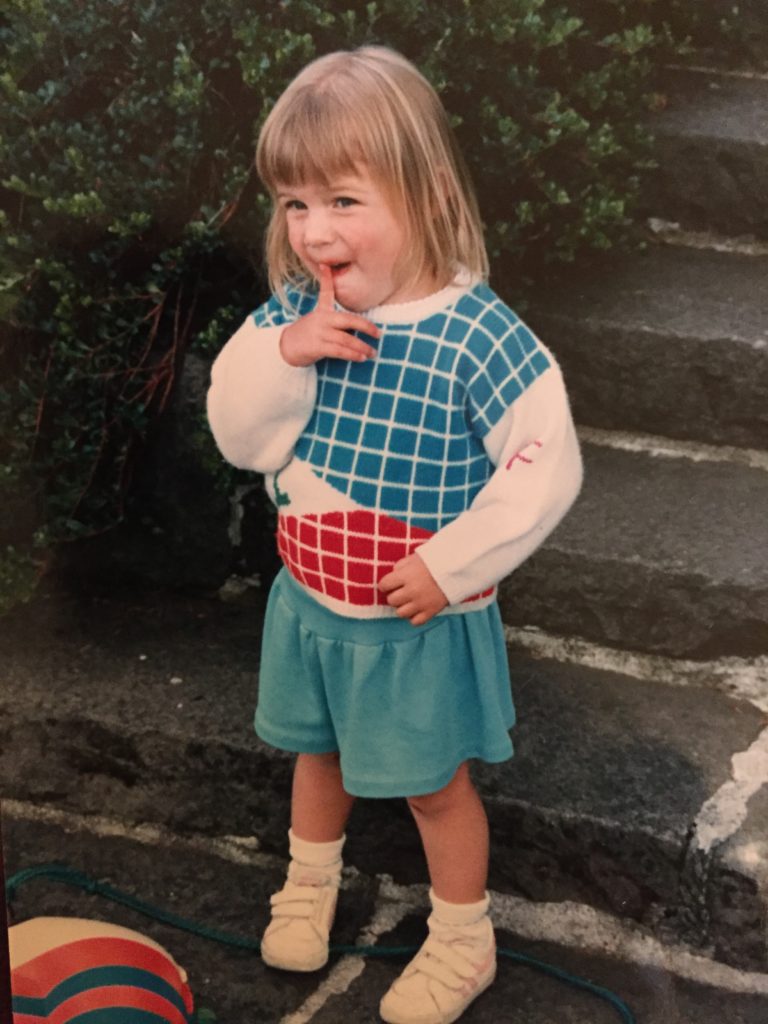I was a colicky baby. A temperamental child. I was prone to tantrums, and expressed myself violently through a wide range of emotions. I felt, and I felt HARD: fits of anger, hours of crying. I felt, and I let everyone know that I was feeling.
I was an anxious and fearful child, and I expressed that. But somewhere along the way, I learned that explosive feelings weren’t a good thing. That to be “normal”, I needed to mask these feelings. And considering I didn’t know how to appropriately express them in a socially acceptable way, I tried my best to bottle them up. But bottling them up did nothing to alleviate what was going on internally.
I saw all the kids around me who seemed to be carefree and flexible, who appeared to “go with the flow.” I so desperately wanted to be them. I wanted to be able to spend the night at my friend’s house without having to call my mom to pick me up. I wanted to not be crippled my worries and rigid schedules. I just wanted to be “normal,” I would tell my parents. “What is wrong with me?” I would cry repeatedly. My crying spells as a teen were exhausting, not just for myself, but for my family. And it wasn’t just crying – I had an anger streak that I didn’t know how to control – at times, the fits of rage and violence consumed me. And those frightened me more than anything,
When the eating disorder started in high school, we all thought it was a way for me to maintain control. Eating disorder research and therapy was in its infancy at that point: the predominant theory was always that when you can’t control other things in your life, at least you can control your food, and that gave you a sense of safety. On a surface level, that explanation seems plausible. So I went through the motions of “recovering,” but it did nothing to address what I was feeling. I didn’t talk about the feelings – I secretly hoped that if I didn’t acknowledge them, they didn’t exist.
I spent most of my 20s and early 30s attempting to hide “my crazy.” I swore I wouldn’t talk about the eating disorder, about the obsessive compulsive personality disorder. I figured I could will my way out of it. People liked me, and it was easy enough to fit in and find friends or start a romantic relationship, but I was crippled by the constant fear that the person would uncover how “crazy” I was and leave me. I spent years in relationships paralyzed, just waiting for the other shoe to drop.
I learned that men are scared of crying, and that crying women are seen as needy. And I sure as hell didn’t want to be needy. I wanted to be the super chill “low maintenance” girlfriend. So even if my crying or emotional outbursts had ZERO to do with my partner or our relationship, I tried to stop it. I couldn’t cry about my broken femur or grieve the loss of racing because then I’d be high maintenance. I couldn’t mourn, so I hid it.
I learned that expressing emotion isn’t acceptable in a workplace environment. And that women who cried were seen as weak or unfit for the rigors of law. It’s not that I WANTED to cry, it was just my natural reaction to ANYTHING going wrong. And the more I tried to stop the tears, the harder it became to do so. Thank God attorneys have office doors, because I spent many days locked behind them.
I learned that I just needed to “manage” my emotions better. That a stronger and more superior person would be able to remain stoic, unaffected. I berated myself that I couldn’t be that person.
Feelings became scary. Because if I actually felt my feelings, I might not know what to do with them. I might express them through fits of rage or through extreme crying spells, and that was a sign of weakness. That was a sign of neediness. That was a sign of crazy.
Anxiety and fear bubbled over, and I didn’t know what to do with them. So I tried to control them. I coped with them through channeling that all to food. The glorious thing about engaging in an eating disorder is that I didn’t have to feel anymore. I could control the uncomfortable feelings through rituals and behaviors. I could alleviate the anxiety by regimenting my life around food.
And the more I did, the less I felt. In fact, the more even-keel I was. I didn’t cry. I didn’t yell. I put on a mask of low maintenance and chill, and I clung to that mask. I was complemented on being so steady, so resilient. Day to day life became easier without emotions. I prized thoughts and logic. I thought about my feelings, but I’m not sure I ever really FELT them.
One of the hardest parts of recovery is that when you strip yourself of those coping mechanisms, the feelings come flooding back. And you have to learn how to sit in them.
During one process group at Opal, I finally let myself grieve the ending of a multi-year relationship. The relationship had ended well before I entered treatment, but I realized I never let myself grieve it. And for an entire hour, I cried, shouted, yelled, and sobbed. And the other clients sat there, holding space for me and my process. But even an hour wasn’t enough. I left the group and signed myself out of treatment for the day, too shaken to do anything else. I went home to my sister’s and walked down to Greenlake. There, I sat on the shore and cried for the next several hours. The emotions came in waves, flooding over me. The tears and sobs felt uncontrollable, yet so incredibly beautiful at the same time. I allowed myself to grieve: not just the loss of that relationship, but so many others losses – other relationships, the loss of loved ones, the loss of sport, injuries, the list goes on. And I cried for the little Amelia who was SO afraid of her feelings, SO afraid of those powerful waves that she couldn’t control. I told her she didn’t have to be afraid.
She didn’t have to be afraid because feelings are beautiful. And there was nothing wrong with her.

I picked myself up after several hours and walked to get ice cream. And for the first time in my entire treatment process, I felt my feelings: the good, the uncomfortable, the downright gnarly. I felt like me, again. Like 4-year old Amelia, happily licking on an ice cream cone. Not consumed by fear. Not riddled by anxiety. Just present. BEING.
Someone once referred to me as an “Ice Queen” because of how standoffish or unaffected I seemed. It’s funny because it’s the furthest thing from the truth. Yes, there were times when I was, but that was the shell of myself hollowed out by the eating disorder. It wasn’t me.
I start every journal with a feeling list. Noting what I’m feeling at the moment. I keep a list of feelings in several places around my house and at work. So if I feel something difficult or something joyous coming up, I can name the emotion. And I let myself sit in it. I let myself express it. And not just to myself, but to others.
I wish we talked more about our feelings. We always joked at Opal that the world would be a much better place if everyone was able to sit around and talk about their feelings on a daily basis. And I truly believe that.
I’m not afraid of feelings anymore. In fact, I embrace them. We live in a society that prizes logic and thoughts – a society that teaches us to not act on our feelings until we “think it over.” A society that values emotional detachment and stoic steadfastness.
But when we lose touch with our feelings, we lose touch with ourselves. I know many people say “you are not your feelings.” I agree, to some extent. The difficult ones pass, as do the wonderful ones. But to feel them IS to be alive. And to be alive is SUCH a glorious thing.

Incredible post. Wiping away tears as I finish reading it. There are so many of us with similar stories, who have also turned to these types of coping mechanisms without at first realizing that they are just burying unresolved feelings. You become more inspiring every month, and I know many of us are grateful that you have taken the time to share your story. THANK YOU.
This is like the text I newer had the courage to write….
Thank you.
First and foremost, this is 100% on point and I fully agree. Feelings are often best if not seen or heard, especially in the work place (especially if you are female). Second, I adore your writing, your style and your use of punctuation (in the correct manner at that). Thank you for articulating what many are challenged with on a daily basis. Wishing you the best and continued positive recovery.
Oh boy, just re read what I wrote … I MEANT Feelings in the work place are often pushed aside – many think they are best if not seen or heard … NOT that they should be. Oh lord. I’ll just stop typing. LOL
❤️❤️
I’m so glad we are mutual criers.
I love you, my friend!
Let it all out.